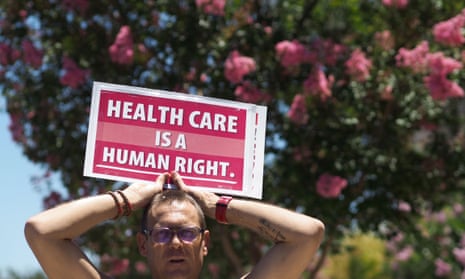Is there a way out of the present impasse over healthcare? On Friday, President Trump suggested one – abolish Obamacare today and replace it later. While we wholeheartedly support the first step, we part company with the president on the second. The only workable replacement, we believe, is no replacement at all.
Instead, we propose doing away with all government-supplied healthcare – indeed with health insurance altogether. If you want to purchase medical or related treatments, then you may do so out of your own pocket. No insurance company or government will help or hinder the process.
Our proposal is exceptional in its simplicity and modesty. It finds solid support in our Constitution, which guarantees fundamental rights such as freedom of speech and gun ownership, but clearly makes no mention of a right to healthcare.
And while our Declaration of Independence proclaims our rights to life, liberty and the pursuit of happiness, it does not guarantee success in that pursuit. Since health is one component of happiness, all citizens certainly have a right to pursue their good health – but the government is under no obligation to help them.
Indeed, many things are necessary for happiness: meaningful work, a sense of purpose, friendships, loving relationships. Is the government responsible for providing any of these things to citizens? Clearly not. Why should the matter be any different with regards to good health?
What are the practical consequences of our proposal? The astute reader will no doubt ask whether this proposal means that those who are not wealthy will sicken and perish from treatable diseases. The answer is clearly, yes. And yet much will depend on the choices that our fellow citizens make.
We expect that even less affluent Americans will choose to treat potentially life-threatening bacterial infections with antibiotics, a highly effective and generally affordable remedy. When it comes to more expensive treatments – such as dialysis for those suffering from kidney failure – many families will no doubt conclude that the cost is simply too great and exceeds the anticipated benefit. A perfectly rational choice in our minds.
Our modest proposal also has the advantage of creating exactly the right incentives to stimulate our citizens and our economy – that is, to make America truly great again.
For example, millions of our fellow citizens fret about the threat to life posed by gun violence. But those who die from firearms are a minuscule number compared to those who die of disease. Making health and longevity dependent on the ability to pay will encourage all Americans to focus their energies on actions most likely to extend a disease-free life – like finding productive, remunerative work.
In addition to elegantly solving our healthcare crisis, our proposal also promises to resolve our immigration and refugee problems. Our present healthcare system, though lagging behind those of all other first world nations, is still good enough to appear attractive to foreigners fleeing economic hardship, civil war, or persecution. However, once it becomes known that if you cannot afford medical treatment here you will sicken, suffer, and soon die, pressures on immigration will quickly subside.
Finally, as our current struggling immigrant population rapidly falls ill and dies for lack of medical care, pressure on our political institutions will also be quickly relieved. No longer will we have to build a costly and politically divisive wall.
Just what the doctor ordered!
